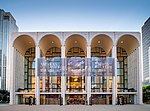Lincoln Square, Manhattan

Lincoln Square is the name of both a square and the surrounding neighborhood within the Upper West Side of the New York City borough of Manhattan. Lincoln Square is centered on the intersection of Broadway and Columbus Avenue, between West 65th and West 66th streets. The neighborhood is bounded by Columbus Avenue and Amsterdam Avenue to the east and west, and West 66th and 63rd Street to the north and south. However, the term can be extended to refer to the neighborhood between West 59th Street and West 72nd Street. It is bounded by Hell's Kitchen, Riverside South, Central Park, and the Upper West Side proper. The studios for WABC-TV are located here. The area includes the 66th Street–Lincoln Center station, served by the New York City Subway's 1 and 2 trains, and anchored by Lincoln Center, a performing-arts venue. Lincoln Square is part of Manhattan Community District 7 and its primary ZIP Code is 10023. It is patrolled by the 20th Precinct of the New York City Police Department.
Excerpt from the Wikipedia article Lincoln Square, Manhattan (License: CC BY-SA 3.0, Authors, Images).Lincoln Square, Manhattan
West 64th Street, New York Manhattan
Geographical coordinates (GPS) Address Phone number Nearby Places Show on map
Geographical coordinates (GPS)
| Latitude | Longitude |
|---|---|
| N 40.773828 ° | E -73.9844722 ° |
Address
Lincoln Center for the Performing Arts
West 64th Street 10
10023 New York, Manhattan
New York, United States
Open on Google Maps






